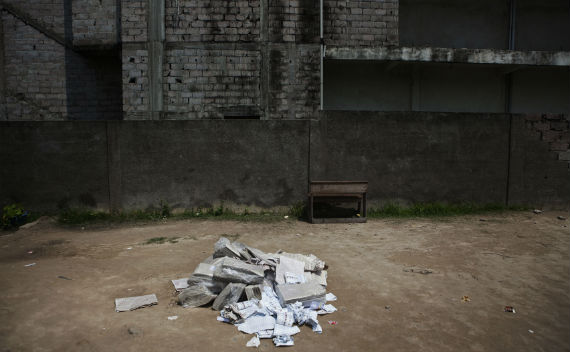Initial Reports on Congo Elections Discouraging
More on:

Voting in Congo’s national elections started yesterday and will likely last several more days. Because of the many offices to be filled, including the presidency, The New York Times describes the ballot as “thick as a newspaper." Not surprising, as the BBC reports, there are eleven presidential candidates, more than nineteen thousand candidates vying for the five hundred Assembly seats and other offices. The Belgian ambassador noted that, “Globally, the impression is rather positive, voting bureaus are open. Of course the rain has made it a bit difficult at a certain stage this morning. But slowly the procedures are going well.” But, already there are anecdotal reports of every type of election fraud and logistical failure, from no ballots at polling stations to ballot box theft to the burning of polling places. Most reports thus far are from urban areas, though the media reports that the worst violence has taken place outside the capital of Kinshasa in Katanga, Kasai-Occidental, and Kananga.
In a country as huge as Congo, and with a weak infrastructure and poor communications, the quality of the polling will vary from one place to another. As only two percent of the roads are paved, CENI (the electoral commission) is using sixty-one helicopters and twenty planes to deliver the ballots. Some planes ran out of fuel and failed to deliver the ballots, while some porters were stuck in the mud caused by Monday’s rains. Squarely put by London’s The Guardian: “some thirty-five million ballot papers printed in South Africa and 186,000 ballot boxes made in China have to be distributed to 63,000 polling stations in a country two thirds the size of western Europe.” It will be days – if not weeks – before the Congolese and the international community reach a conclusion as to the credibility of the proceedings. But, the Belgian ambassador’s comments notwithstanding, on balance initial reports are not encouraging.
Of the ten opposition candidates President Joseph Kabila faces, Etienne Tshisekedi is the best known. The number of candidates splitting the opposition vote makes a Kabila plurality likely. Kabila had the constitution amended to eliminate a second round if no candidate received a majority of the votes. If Kabila does win a plurality, the issue will be the extent to which the Congolese themselves accept the outcome. In an address to his supporters, Tshisekedi has already declared himself president, and his supporters threaten to take to the streets should he lose.
Congo’s 2006 elections were judged successful. Then, the UN and the international community played a prominent role and took charge of many of the logistical arrangements. This time, if not entirely absent, the role of the international community has been much reduced. Mathieu Bile, the director of the Electoral Division of MONUSCO (the UN mission in Congo) warned that “It is not in our mandate to evaluate the work of the CENI and say whether it is good or bad… If people have suspicions, it is at that moment that we need to explain that we only offer additional assistance to the CENI’s own strategic plan.” The opposition parties are already accusing the CENI of massive fraud and lack of transparency by the opposition parties. If the elections result in political chaos, the international community as well as the Congolese people will likely pay a steep price, given Congo’s key position in central Africa.
More on:
 Online Store
Online Store